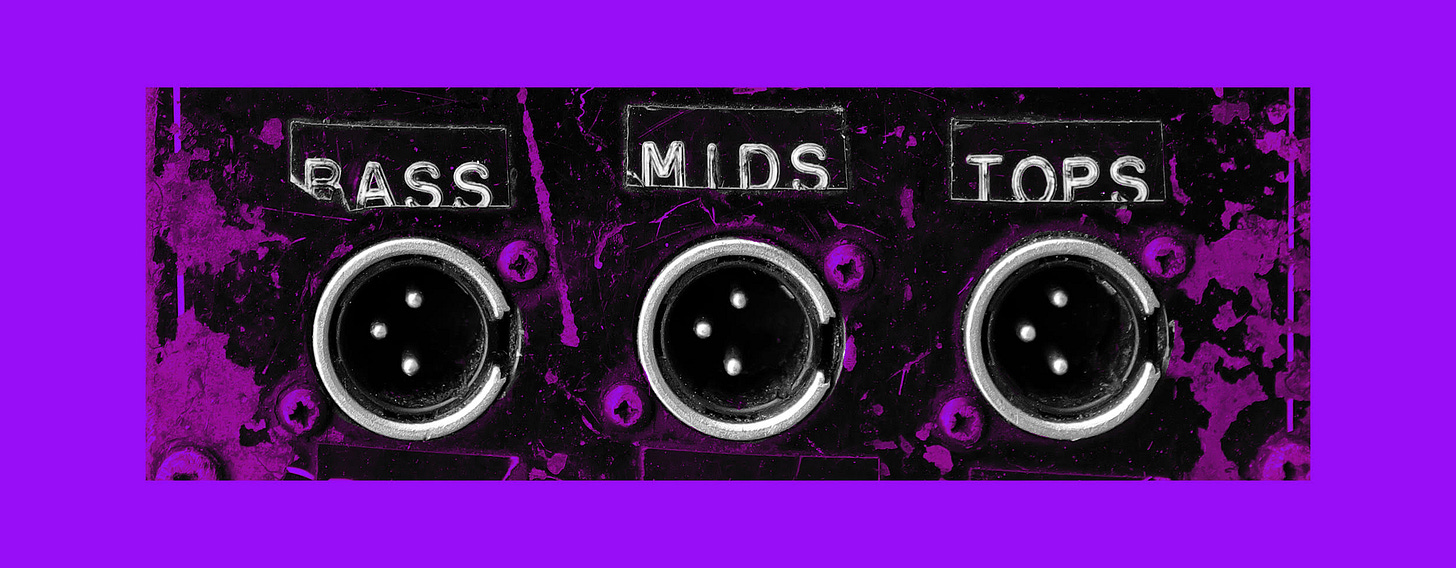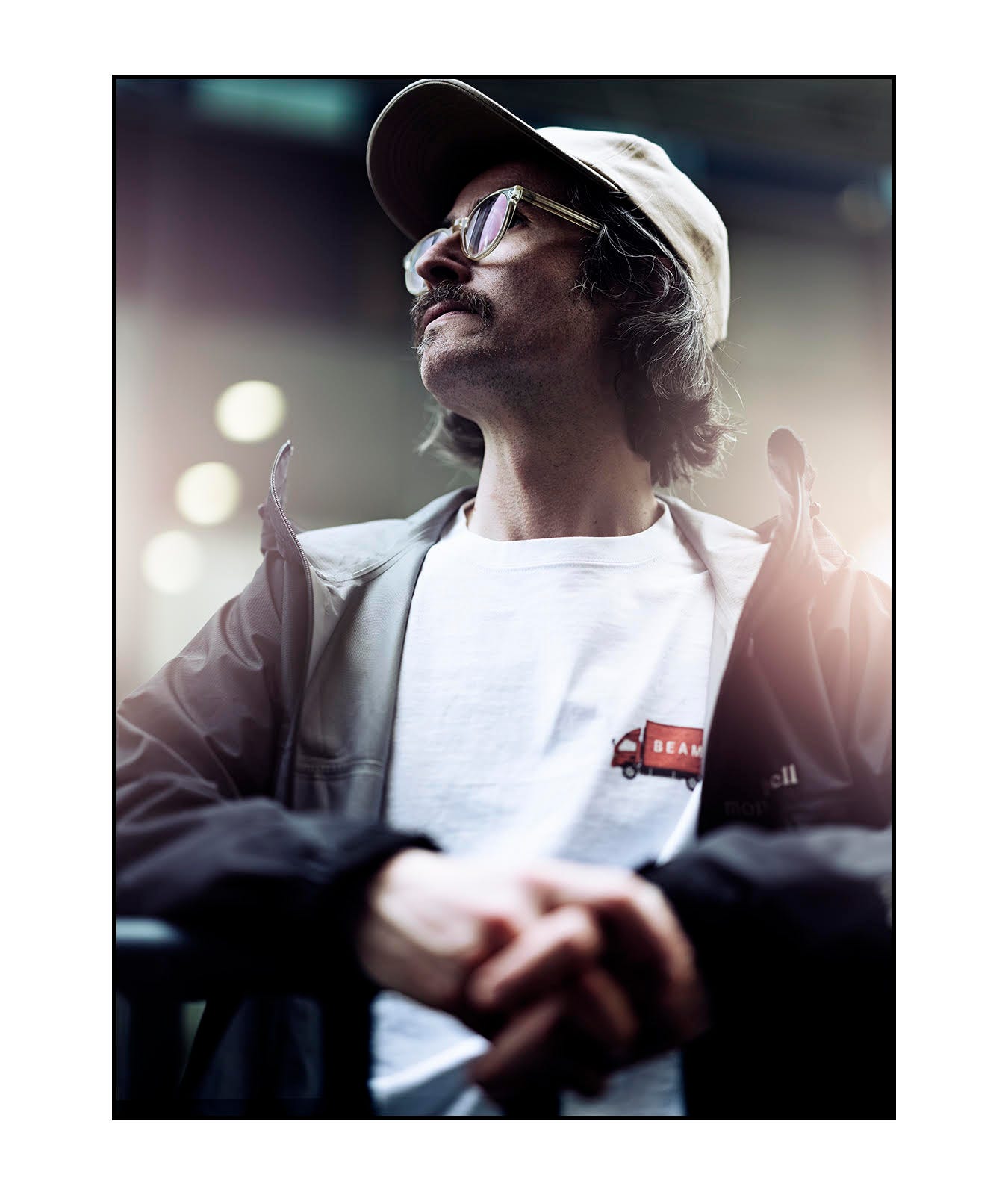No. 36: Dr. Matthew Yee-King
Easily the best kickboxing jazz professor of cutting edge tech we've featured here.
Hi everyone, so it’s a really exciting one this time, from a personal history perspective. First up, though, apologies for the delay here. That’s entirely down to me (Joe) having a work blip, and having to frantically hustle to get the freelancing canoe upright again. All good now, he said, rubbing his lucky rabbit’s foot and fondling some clover, but thanks for bearing with us.
This is an epic one, and it’s been extremely fascinating for me. Dr Matthew Yee-King is a busy academic in the fields of computing and AI, but he’s also a virtuoso drummer, maker of some mind-blowing electronic sounds and… my former flatmate. He and I were in a couple of different mouldy shared houses in Brighton just after we finished at Leeds and Sussex university respectively, and both working in a pretty deranged music/art scene which I wrote a short history of for RBMA, archived here - I’d recommend this as a starting point, but I’ll try and fill in detail in footnotes as we go.
The key parts from that time are probably: Yee-King went to school with Tom “Squarepusher” Jenkinson; he played in Balzac, the house band at a cabaret club I ran; Jamie Lidell joined that band as singer; Yee-King wrote a lot of incredible solo music which eventually led to albums on Rephlex, Bug Klinik and Trash; he and James Stephenson from Balzac became the rhythm section for Lidell and Cristian Vogel’s Super_Collider project; we drank a lot of cheap corner shop cider and got injured a fair bit. Afterwards as Yee-King’s career took off he’d work with a dazzling array of talents, which you’ll hear all about here!
Our paths had diverged for a while but he went on to amazing things in his research work on AI, and would ever so often pop up either doing an extraordinary gig of some kind or on the radio demonstrating how someone could play an instrument with brain waves, that kind of thing. We stayed in occasional touch, and I saw him at We Out Here last year, where his daughter was playing with the Tomorrow’s Warriors programme, and have been meaning to do this interview ever since. It didn’t disappoint.
Aside from all the cultural-historical stuff, in a time when AI is getting quite a bad name and or a huge amount of hype, it was extremely interesting to talk in depth with someone who’s been in that field for 30 years now. And as with so much in sound tech, exciting to get a glimpse of what happens in places where everything isn’t social media-ed to death before it’s had a chance to just exist properly. Anyway no more guff from me, let’s get into it – and enjoy Brian’s glorious photos, which were taken at Goldsmiths College, where Yee-King works.
Okay. Let's start with a super basic one – what do you do??
Well, so – my big job is that I'm a programme director for a computer science degree now. So that's with the University of London and that takes a lot of my time and that's a big thing with, like, 5,000 students who are all over the world in every conceivable country. So they're all studying remotely and so I do a lot of work on that. And that's been good, we started that in 2019, or we launched in 2019 and it makes everybody except for me a lot of money and they're kind of fairly happy about it. So that's that, but then they gave me some dedicated research time last year too, so that was quite fun. So that allowed me to pick up some of the things that would've been very much on the back burner and sort of crank them up again.
And so I've been getting back into this whole world of AI improvisers, which I used to do quite a bit of work on with Finn Peters – and there's lots of stuff on that. And yeah, I wrote a book as well, I'll show you in a minute. So I actually asked for my research time in order to write this book, which you can see here [holds it up]1. Yeah, and then I accidentally didn't realise that the research time was in the next year, not that year. But I'd already agreed to deliver the book. So I sort of end up writing the book in the weekends [grimaces]. So that was quite hard work. But I did that, that came out last year. And then I had the research time, I was like, great, nothing to do there. So so I ended up just doing a bunch of trying to basically train myself up on large language models, because obviously, that's the big thing that everyone wants to do in AI. And I kind of wanted to get my chops together on that, putting a bunch of stuff with it on the online programs, like various things with language models. But for the music stuff, I'm looking at training models and investigating how good they are compared to the other models I was using, basically, because, yeah... well, that's kind of a long story.
So I've got a new project on the go. One more before I stop rambling, heh. I've just started this... So I got to meet John Chowning earlier this year, who, if you haven't heard his name, he's the guy that invented FM synthesis2. So the Yamaha DX7 and all those synths that are on every single track in the 80s, all that – he invented the algorithms for it back in the 60s. He was working at Bell Labs, I think. And so he was... he's 91. And he came to Goldsmith to do a presentation. And I got him to sign my little Korg DX7 emulator, he signed that. So I just started thinking I'd like to do a project. So I just started working on a project with that in mind. So all the tracks are going to be compositions based around FM synthesis, all the different, weird and wonderful ways that you can do it. So I just started on the first one, like last week, basically. So yeah, so I did a bunch of that and that's it, really.
That's fantastic, so the day job is across the computer department, it's not specifically music related.
No, no, no, that's right. So it's a Computer Science degree, as in that's the title, but it's kind of creative. I would say it's creative computing by stealth in that we have tried to, well, I've tried to make... it's encouraged me to embed creative stuff in all of the ways we like teaching computing. In other words, we were doing music, we were doing graphics, and people were doing fun stuff with computers, but they're learning all the hard algorithmic stuff in order to do that. So, yeah, there's a course on there. See the one that I made that they basically build like a DJing application, for example. And then there's an AI course where I show them how to build a whole AI songwriting and singing thing from different pieces. I've definitely put all that stuff in there because I basically enjoy it. Yeah, why not? So, yeah....
That's quite a lot going on. When I first met you, I can't remember which way round it was – but you'd just come off an evolutionary science degree and we're going to do AI or was it the other way round?
Yes, well, so my original degree was biology and genetics, zoology, proper biological sciences. But the bit I enjoyed was evolution theory stuff. That was one of the most interesting bit in the genetics, learning that it's basically a big computer in a certain sense. But then I then ended up doing a Masters, which was evolutionary adaptive systems, which is basically using evolution theory to design, I guess... computational artefacts, you might say, be they algorithms or bits of electronic circuitry, or bits of modular synthesiser circuitry – which is what I used it for. And then after that, I did the PhD, which is ultimately led me to deeper and deeper into AI stuff, basically. Yeah, the evolutionary stuff was the trendy AI in the late 90s, artificial life and all that...
It's kind of coming back because there's been a DeepMind paper where they've just evolved – or they've used a combination of language models and evolution, evolutionary computing – to evolve a bunch of programs like one that solved this matrix multiplication problem that some clever mathematician in the 60s or something solved in a certain number of steps, you know... That's important because matrix multiplication is essentially the underlying thing behind all neural networks, you know, and all computer graphics. So when you think of the number of watts you can save by basically reduce the number of multiplications required by the, you know, a few few bits on that chip can get reduced a few per cent on every chip that's doing any of that stuff – which is pretty much all of them in the entire planet right now – there's a lot of electricity to be saved anyway, so they did it one less step than this guy from the 60s could... Anyway, so evolution theory is not dead. That's my point... in computer world.
OK hopefully we'll talk about perception of AI and where it fits or doesn't fit in culture and so on in a bit. But if we could talk about how you went into all of these things… I remember when we were out in raves, you kind of talking about little groups of people in terms of evolutionary niches, it was like...
Yeah, it's a mindset [laughs].
Right, it's like “There's some jackals, there's some meerkats.” That kind of thing. But with regard to the raving as well and music, I could see it was feeding into your thinking about improvisation and sound and what you were studying all at once. You started learning music quite early?
Oh yeah, so I played the classical guitar for a few years, from the age of six. So I probably did like four years or something on the classical guitar, so I must have been... I can't really remember how good I was or whatever, but I must have been reasonably good after four years of lessons. And that sort of was a bedrock. And then I got bored of practicing and just didn't play it anymore. But yeah, then got back into music probably when I was about 15 playing the drums with the people you probably know. So yeah, that's my early music history.
And did you grow up entirely in Essex?
Uh, entirely, yeah, yeah, I'm not sure I'd call it growing up.
[laughs] Your early years then...
Thrown up. But no, Essex, yes. So I started in an even worse place, which is um, Thurrock, which is kind of part of Essex, but it's the really nasty bit where all kinds of horrible people are from. Grays. And then later when I was two, moved to Stanford-le-Hope, which is also in Essex. Yeah, so I sort of worked my way through the rotten towns of, you know, Southern Essex, and eventually ended up in Southend and stayed there for a while until I was 18.
Keep reading with a 7-day free trial
Subscribe to Bass, Mids, Tops and the Rest to keep reading this post and get 7 days of free access to the full post archives.






